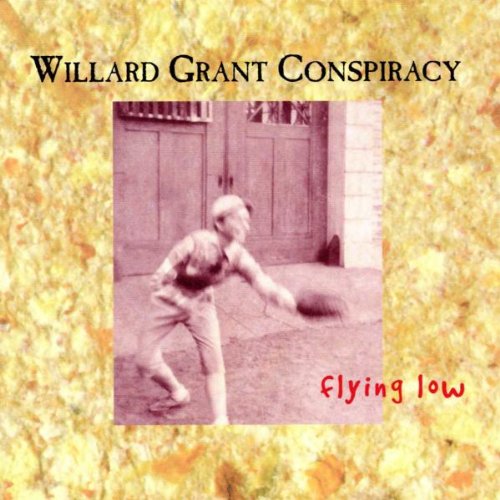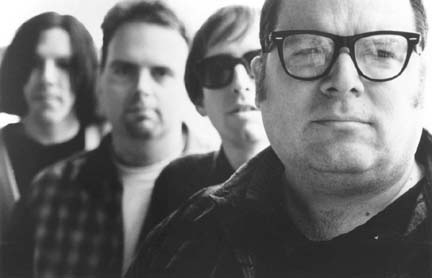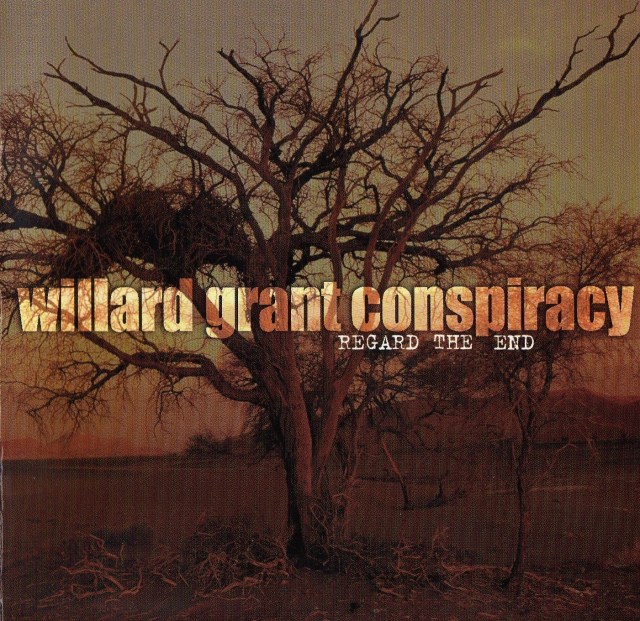 Amid birthdays and valentines, sad news hit this week as word spread that Robert Fisher, singer, songwriter, storyteller, and bandleader extraordinaire of the Willard Grant Conspiracy, died after a year-long struggle with cancer. I hadn’t spoken to Robert much in recent years, after his move back to his native California in 2003. But his expansively brooding baritone and band — at once comforting yet unsettling — were among the first things I heard and saw when I moved to Boston in 1997.
Amid birthdays and valentines, sad news hit this week as word spread that Robert Fisher, singer, songwriter, storyteller, and bandleader extraordinaire of the Willard Grant Conspiracy, died after a year-long struggle with cancer. I hadn’t spoken to Robert much in recent years, after his move back to his native California in 2003. But his expansively brooding baritone and band — at once comforting yet unsettling — were among the first things I heard and saw when I moved to Boston in 1997.
“He had been suffering throughout 2016 but typically of the man he never made any fuss whatsoever,” his London-based record label, Loose Music, posted on Facebook on Monday. “He was busy still holding down his day job and recording tracks for his 11th album. We first heard his music back in 1996 when Loose were doing press for Slow River/Rykodisc. The album was called ‘3am Sunday @ Fortune Otto’s’. It totally blew us away – this was music from another planet…and the voice…Robert Fisher sang as though he had already seen, understood and lived through the big picture. A booming baritone, capable of both immense power and heart-breaking subtlety.”
I thought so too when I heard the same album at the same time (it’s entirely possible Loose had sent me the disc). And so I had the privilege of doing what any music journalist loves to do: discover and champion an under-heard artist’s vital work, and help rectify the wrongs of a music industry mainstream that often gives short shrift to emotionally harder, deeper, more nuanced music. As a result, a huge chunk of the listening public never gets to hear it, or even know it exists. And so, self-fulfilling prophecies (‘this won’t sell’) are an endlessly repeating cycle.
But helping the Willard Grant Conspiracy build an audience wasn’t my main intention for wanting to write about them. My main intention was, pure and simple, to write about a band, sound, and a songbook that touched and inspired me — reminded me anew why music mattered in my life, as a core part of it. And because Robert and his cohorts were pretty prolific, I had the opportunity to interview him and write about his music many times over the arc of a decade. I saw Robert perform numerous times to both sold-out concert houses and half-filled rooms, both alone and with a full ensemble.
He and his bands — which could range from four to a dozen people onstage — were always splendid, and utterly riveting. Some of New England’s finest musicians — some well known, some not — passed through WGC’s ranks at one time or another (Robert always chuckled that if ‘somebody says they played with us, they probably did’).
We sometimes hung out together at his apartment in Jamaica Plain, or mine a couple of miles away in Brookline, usually precipitated by an interview, and talked music while playing each other records. And I did consider him more than merely an interview subject on the local music scene. We were roughly of the same generation, having grown up honing our musical educations during the 1970s and ’80s (I’ve since found out that Robert, who was reportedly 59 when he died, was a few years older than I had thought; I just assumed everybody I covered on the independent music scene was younger than me). We loved the old stuff. We loved the new stuff. And our free-flowing conversations often reflected that. During those times together, Robert was as serious and measured as you would think he’d be. But he was drolly funny, too, and given to easy laughter and a gentle manner.
Funny, just the other day I happened to think of Robert. I had no idea he was sick and wasn’t even thinking about the Willard Grant Conspiracy. Instead, I was chatting with one of the guys at the record store I haunt a couple of times a week about a double live bill featuring two of my favorite Swedish bands from the early 2000’s, The Hives and The Soundtrack Of Our Lives. I had covered their tremendous Boston concert ages ago. As I related the delirious memory, I flashed on how Robert and I had both flipped our lids like teenage boys when we compared notes on what we had both seen (separately): a video for what would be the Hives’ breakthrough video, “Hate To Say I told You So.”
We had both loved the spectacle of it. But I was taken aback by his unabashedly enthusiastic reaction to the Hives’ hyper-caffeinated, bubblegum-garage antics, the pose of it all. That’s not something I associated with Fisher or his outlook. Rarely had I seen this large, bearded bear of a man, usually given to deep thoughts and dour Nick Cave/Tom Waits/Leonard Cohen comparisons, so gobsmacked, so teenage fanboy giddy. This was a guy, after all, whose music was primarily preoccupied with little subjects such as mortality, loneliness, and the barely comprehensible meaning of our time here. But maybe for him, the Hives were a joyful escape, a jolting reminder about what he loved about rock and roll — and being alive — in the first place. And why music, in all its forms, mattered.
I count as my good fortune that our paths crossed, and I will remember Robert as a gifted artist of intense, almost magisterial power, focus, and sensitivity who always sought — and often attained — a profound beauty in his music that cut to the quick of the soul. To me, his and WGC’s best stuff sounded as wondrously intimate and indestructible as a beating heart — and as preciously fragile as one too. The devastating “Ghost of the Girl in the Well,” for instance, remains one of the most haunting examples of elegantly distilled anguish I’ve ever heard; the fact that it’s based on a true story makes it that much more harrowing.
In tribute to the wide skies, the thunderclouds, the gentle rains that swept his work, here are two pieces — my first and my last — that bookend the clutch of interviews and reviews I wrote about Robert at his various creative junctures. In particular, the last album we discussed, “Regard The End,” has come to be seen as perhaps his finest work, epic in scope and painstakingly executed. (The British music magazine, Uncut, for instance, named it among their top 150 albums of the decade). I see it also as his most personal and challenging effort, having been the hard-won result of an array of significant creative and life changes for Fisher. I recall how quietly proud, yet self-deprecating he was of the work as it piped from the stereo in his small living room. Of course, given the events of this past week, both the title of the album and the music within now feels freighted with an additional melancholic layer of poetic sorrow. But somehow, I don’t think Robert would be displeased at that.
 The Willard Grant Conspiracy: Building A Mystery (Stuff@Night magazine, September 1998)
The Willard Grant Conspiracy: Building A Mystery (Stuff@Night magazine, September 1998)
Atmosphere is not always easy to come by. But somehow, the Willard Grant Conspiracy — a Boston-based outfit named after a secluded, woods-hidden street where the band first recorded — comes by it with an almost off-handed grace. Perhaps some of that commodity has to do with the fact that, besides vocalist/lyricist Robert Fisher and multi-instrumentalist Paul Austin, nailing down the group’s cast of characters is at best a somewhat murky endeavor. After all, what element serves atmosphere better than mystery? Then, of course, there’s the name.
“We felt it was like a conspiracy,” remembers Fisher, “because we didn’t know who would be playing with us or where we were headed.” On the, er, “band’s” first album, the just as obscurely titled 3 am Sunday @ Fortune Otto’s released on Fisher’s own Dahlia Records label, the inside jacket states that “anyone who tells you they played on this, probably did.” Likewise, the group’s gorgeously disquieting new disc, Flying Low (Slow River/Rykodisc), doesn’t offer many clues either — although Fisher claims the ambiguity is intentional for pragmatic, rather than dramatic, reasons.
“I keep it vague on the record because if, in some cases, contractually the musicians can’t be on the album, it makes it easier on them,” he says with a smile. “But it’s not like I’m trying to make it a big, mysterious thing.” If the deluge of fawning U.K. press and a steadily gathering groundswell of support here in the States is any indication, the Willard Grant Conspiracy won’t be much of a mystery much longer.
During its recent 26-date European tour (where Flying Low was first released earlier this year) WGC played to packed houses everywhere, receiving accolades in every U.K. rock ‘zine from Melody Maker to the New Musical Express to Uncut (the latter of which justifiably called Flying Low a “masterpiece of lovelorn desperation”). Though Fisher modestly points out that most of those sold-out U.K. dates were in support of other better-known headliners like WGC’s Boston neighbors, Come, that simply doesn’t explain why so many people camped out early to hear the band, taking up their territories around the stage. And listening hard.
“In Europe, promoters would come up to us and buy a CD instead of just asking for a free one, and then they’d ask us for a signature. We were shocked by that, but people are really music fans there,” Fisher says. “I mean, I know Ryko has a great name and reputation, but we’re a strange little band.”
“We’re a quiet band, so people think that we’re going to be playing relaxed music,” he says. “And it’s not relaxed music. But I think that to really hear it you have to pay attention closely. We play rock clubs where people are used to having the music come at them. With our music you have to come to it a little bit. I think the biggest change I’ve gone through over the last ten years is volume level. Now, it’s all about mandolins and squeeze boxes as opposed to three guitars and feedback.”
Even though it’s he who first coined it, Fisher’s not so sure he likes the term “swamp noir” being used to describe WGC’s brand of music. True, Flying Low is drenched in dusky, sepia-toned atmospheres (there’s that word again). It’s a mostly deserted world of long, lingering shadows where guys like Nick Cave and Mark Eitzel brood in a half-light that’s either salvation or damnation — a distinction that depends solely on whether you think being alone is solitude or isolation. A world where the songs thread through a musty room and gather there like settling smoke.
“But we’re not really swampy,” Fisher notes. “The album’s all about urban, modern relationships and desperation and longing — and yet it’s also about universal themes.” The topic that fascinates Fisher most as a songwriter is personal struggle, human fallibility. And on songs like “Bring The Monster Inside” and “House Is Not A Home,” he writes with an almost frightening frankness and intimacy. There’s a kind of palpable, exhilarating horror to these, as well as many other of WGC’s, songs. “I guess it’s the same thing that makes good movies good and good books good,” Fisher says. “Because everybody’s got something in their life that they’re trying to overcome.” And sometimes it’s the process of the struggle itself — not necessarily its conclusion — that’s important.
Perhaps that’s why Flying Low sounds so compelling. “We made this record upside down,” he says. “We put the acoustic guitars and vocals on first and added the drums and bass last, so we had the rhythm section follow the guitars and vocals.” The result is a supple sense of movement to the quiet turmoil; restlessness and resignation vying for position inside those vast, silent shadows. Now that’s atmosphere.
 REGARDING THE BEGINNING/BOSTON PHOENIX (February 2004)
REGARDING THE BEGINNING/BOSTON PHOENIX (February 2004)
“Moving things forward”, as he puts it, is a theme that preoccupies Willard Grant Conspiracy frontman Robert Fisher’s thoughts and actions these days. In fact, movement and all the word implies – departure, arrival, change, momentum – has been squarely at the center of Fisher’s life for better than a year now.
After eight years, as many European tours, and four albums (three of them on Salem’s Rykodisc/Slow River label), his shape-shifting collective WGC ended their relationship with their old label, signed with a new imprint, the Ipswich-based upstart Kimchee Records, and are about to release their fifth full-length disc, Regard The End, this coming Tuesday.
True to WGC tradition, the album’s already been released in Europe, where it’s garnered raves and was named one of the top five releases of 2003 by the British music magazine Uncut. Among its myriad attributes, the disc features fetching guest appearances by Throwing Muses’ singer Kristin Hersh, (who turns in an especially haunting vocal performance on the devastating real-life portrait, “The Ghost of the Girl in the Well”), local folk-pop songstress Jess Klein (who does something similar for “The Suffering Song”), and Fisher’s new labelmate Blake Hazard (who sprinkles sunshine all over the John Dragonetti drum-looped charm bracelet “Soft Hand”, which is easily the most unabashedly poppy thing Fisher’s ever put to tape).
Regard The End is being touted as the band’s strongest disc yet – an achievement made all the more remarkable considering it’s also being touted as WGC’s most commercially viable effort to date. Want proof? Upon its release in Europe last summer, “Soft Hand” was tapped for the soundtrack to the Farrelly Brothers’ latest film farce, Stuck On You. Fisher’s outfit’s often been described as “cinematic”, but Matt Damon/Greg Kinnear comedic vehicles are not what usually leap to mind when one ponders WGC’s catalog of brooding torment. Then again, Fisher’s always publicly flinched at those doomy Nick Cave comparisons.
“I’ll wait to see if the record sells, but I kind of feel vindicated,” Fisher says over lunch at Matt Murphy’s Pub in Brookline. “You have to find the right people to move things forward, and having ‘Soft Hand’ show up in a Farrelly Brothers movie says there’s a legitimate, broader audience for our music than anyone to date has believed there was – other than me and a few other people. For the most part, people haven’t thought of us as a band that can translate to a broad appeal and I just think that’s wrong. I’ve always thought that’s wrong.”
Kimchee Records co-founder Bob Dubrow is a longtime fan of both WGC and Fisher’s previous outfit, Laughing Academy, and as a DJ played both bands’ music regularly on his WMBR local live radio show, “Pipeline!” He hopes his label can help prove Fisher’s point. “I think this is the strongest record we’ve been involved with,” says Dubrow. “(Robert) played my last ‘Pipeline!’ in February (2003) and played four or five songs and I had shivers going down my spine. I knew something was up with these songs. I don’t think the sound strays far from the sound you find on other Kimchee records, which is a certain darkness and seriousness of purpose.”
Ironically, what set Fisher’s recent professional triumphs in forward motion was his willingness to take a few steps back first. After WGC collaborator and guitarist Paul Austin split from the band after the release of 2000’s Everything’s Fine, Fisher had to essentially teach himself how to play guitar well enough to perform the songs in a live setting. “This is the first record I made without Paul,” he says, “So it was really important that I proved to myself that I could pick up a guitar and be disciplined enough to learn it well enough to not disappoint my band members and not disappoint an audience.”
Then in 2003, after living in Boston for nearly 25 years, Fisher moved back to his boyhood stomping grounds of Southern California’s Antelope Valley, buying a house at the edge of the Mojave desert, where as a kid “we used to wander out in the desert and hunt rattlesnakes and lizards.” It’s been a bittersweet return for the songwriter, who claims to miss Boston and his close-knit group of friends and musicians, but who obviously continues to be fascinated by how closely his childhood hometown still hews to his teenage memories of it.
“The desert’s still an idiosyncratic, strange place full of unusual, eccentric people and it’s like a time warp. Where I live, hot rods are still the thing and the car culture that everybody’s familiar with through American Graffiti still exists – it’s all American Graffiti and meth labs and suburban homes. I still expect to turn on the radio and hear Wolfman Jack every day, but of course I don’t.”
WGC albums have always confronted and contemplated life’s big themes – death, despair, misery, redemption – refracted through sepia-toned character portraits or metaphorical fables that sounded as old as the hills. For Regard The End, Fisher followed his band’s approach to what now seems like its logical, natural conclusion: taking the lyrics of traditional folk and work songs and recasting them in a modern light by adding original music and then setting those works alongside entirely new WGC compositions.
“I discovered, starting with Flying Low, that some of my songwriting was moving toward traditional themes and subject matter and tone,” he says. “A few people who are fans of the music said to me, ‘wow, that really sounds like a song that was written 150 years ago – that’s kind of a timeless song’. So I started thinking, ‘what does that mean?’ And what it means is that I was reaching these universal subjects, and reaching into them in such a way that they seemed like they had existed before. As a songwriter, I thought it would be fun to explore that further.”
Fisher envisioned his inquiry – scouring his collection of old Alan Lomax field recordings was his main modus operandi – as “an exercise in bringing something forward so that it doesn’t sound antiquated. People who want to hear things that sound antiquated tend to ghettoize it – they put it in a place where they can’t listen to it in a way that affects their current life. Ideally I wanted people, unless they looked at the song credits, not to know what was what – that was my goal. Here are these songs that were written 200 years ago that have as much relevance and resonance now as they did then – maybe more so, because now they’ve been infused with 200 years of history.”
Mission accomplished. The music here is lush, lavish and layered; a vibrant aural landscape of impeccably arranged guitars, pianos, trumpet, melodica, and strings. And unless you cheat and glance at the lyric booklet, or have memorized a century’s-plus worth of American folk and field recordings, it is virtually impossible to tell which of the two – the waltz-time opener, “River In The Pines”, say, or the roadside-preacher tale, “The “Trials of Harrison Hayes” – was written in the 1860’s and which was written in 2000.
“I’ve been getting e-mails from people who say it’s really nice that there’s an anti-war song on the record, and at first I thought what anti-war song? ” Fisher says of the bluesy, violin-steeped “Another Man Is Gone”. “It’s a slave tune, but it made sense to them as an anti-war song. They’ve made the song their own.” Despite its somber connotations, the meaning behind the disc’s title, Fisher says, has as much to do with life and the living of it as it does with death. “The subject matter (of the album) is mortality and I guess, for me, that’s the big theme in all of art, anyway – how you come to terms with your mortality sort of defines how you live your life.”
One track in particular, “The Ghost of the Girl in the Well”, seems to embrace both of those extremes. The song, carried by a quiver of violin cross-stitching across pensive electric guitar, is perhaps the most simultaneously chilling and stirring composition Fisher’s ever recorded. He wrote the lyrics a dozen years ago with a close friend, Manny Verzosa, and it’s based on a true story about a 14-year-old girl who is sexually abused and terrorized by a man “who owned my family.” She flees him and attempts to hide, only to fall into a well, where she dies alone and undiscovered. Kristin Hersh’s spectral vocal floats above Fisher’s and then plunges like an arrow into a heavy heart; the moment feels like a solitary sob – from the girl and for her, – at the bottom of a pitch-black darkness.
When they first attempted the tune, neither Verzosa or Fisher was happy with the music, so the song was set aside. Several years later, Verzosa was killed in an automobile accident while touring with the Silos. But in a sense, his voice, much like the ghost of that girl, lives on inside this song.
“It’s extra special that Kristin’s on it because he was a huge fan of hers. It’s funny, because Manny was on the first record (3 AM Sunday at Fortune Otto’s, Dahlia Records, 1996) too. There’s a sound verite piece that’s Chinese New Year in New York, and he recorded that and gave me the tape. When we were making the record, he had recently passed on, so my way of putting him on the record was putting that sound piece on it,” Fisher says. Just maybe, says Fisher, “his spirit infuses both records in a unique way.”
http://loosemusic.com/category/willardgrantconspiracy






Reblogged this on RPM: Jonathan Perry's Life in Analog and commented:
A year gone already, which I can hardly believe, perhaps because I’ve continued to keep Robert Fisher’s voice close to my ear and his songs close by my elbow. For folks who have yet to hear it, there’s no time like the present to discover and explore the magnificent music of the Willard Grant Conspiracy. There’s a bunch of it here, along with some stuff I’ve written over the years about this prodigiously gifted artist who deserves to be heard, now and for the foreeable future. Dig in.
LikeLike
[…] others: His official obituary, and appreciative tributes from Matthew at Song, By Toad, Jonathan at RPM/Life In Analog, and Loose Music on […]
LikeLike